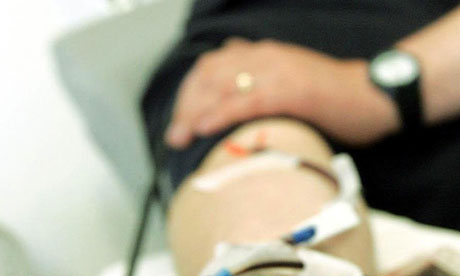
I’m British. I’m a big Gloria Estefan fan. I love steak. I’m gay. All but one of these statements prohibits me from donating blood in Australia.
Perhaps it would be understandable if my love for Latino pop barred me from blood donation – it could be catching. They shouldn’t encourage me; the Ricky Martin comeback is bad enough. But as it happens, Martin wouldn’t be able to donate blood here either. Like me, his sexual orientation would outlaw him from doing so.
First, to the British beef. Due to the fact I lived in the UK for longer than six months between 1980 and 1996, I’m barred from giving blood in Australia – apparently, I may have mad cow disease.
This part of my double-ban doesn’t offend me. Even if I didn’t love steak, I’d still be barred. The Australian Red Cross Blood Service advises that British veggies who lived in the UK during this period are also banned because of the “possibility of unknowing exposure to beef or beef products.” It’s understandable. Let’s face it, who hasn’t accidentally grabbed the Bovril instead of the Radox during a bubble bath and later regretted it? As such, British blood, a sizeable potential supply, is closed off. Fair enough; safety first.
But the blood supply of O-negative – the universal blood type – is running low. Just nine per cent of Australians have O-negative blood, and the bank currently has three days worth of supply of it; their aim is to have six days’ supply of all types.
One would assume they must have been using last week – which was National Blood Donation week – to do everything possible to increase the blood supply from the 600,000 Australians who currently donate blood, right?
Well, not for everyone. Gay men aren’t barred from giving blood – they’re "deferred" for 12 months. This means if you’re gay but you’ve been celibate for a year, your blood is welcome.
I hope I’m not perpetuating pernicious stereotypes too much here when I say that I don’t know many gay men who’ve abstained from sex in the last fortnight, let alone the past year. The deferral may as well be a ban, at least in my red-blooded circle.
I took the blood service’s handy online eligibility quiz. Both times I played a different character. First, I played a gay man who has only had protected oral sex with his monogamous partner of five years. Result: cannot give blood. Then, I played a straight man who has had multiple sexual partners in the last month alone, and never used protection. Result: the quiz played an applause sound – you can give blood right now!
I asked Kathy Bowlen, national media manager at the Australian Red Cross Blood Service, why their current system perpetuates the stigmatising myth that gay men can’t be trusted with their sexual health. She advised that a recent independent review into this situation had recommended that “removing the deferral for (men who have sex with men) in monogamous relationships would introduce an unacceptable risk to the ongoing safety of the blood supply.”
This review happened last year and recommended the deferral period is reduced from 12 to six months “providing that further donor research demonstrates that this wouldn’t threaten the safety of the blood supply.” This research is due to be completed within the next few months.
I also spoke to Rob Lake from the Australian Federation of AIDS organisations, which campaigns for the deferral to be reduced to “at least” six months. He said: “We’re campaigning for regulations based on activity rather than identity. We presented a case for a six month deferral, but that won’t be the end of it for us. As science and testing progresses, we’ll have better evidence to support our case.”
I worked at UK gay equality charity Stonewall when, during our campaign to end the blood donation ban for gay men, we learnt that the "deferral" could stigmatise in unexpected and concerning ways. In one instance, a blood donation van pulled up outside a police station, and an officer who didn’t feel comfortable being out at work had to stumble through humiliating excuses why he couldn’t donate with his colleagues.
Safety of blood supply is paramount; nobody sensible disputes this. Exposure to HIV and other infections should be tested accurately based on activity for all donors. But to "defer" monogamous, safe-sex practicing gay men is discriminatory and demeaning.
If the blood bank needs more O-negative, it needs to stop being O-so-negative by rejecting potential healthy gay donors just waiting to help.

